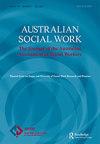Improving Service Responses for Children and Young People Who Experience Domestic and Family Violence: A Way Forward
IF 2
3区 社会学
Q2 SOCIAL WORK
引用次数: 0
Abstract
ABSTRACTDomestic and family violence experienced by women and children is a significant social issue. Children and young people’s exposure to domestic and family violence is a recognised form of child abuse and neglect nationally and internationally reflected in child protection legislations and practice guidelines. There is an increasing imperative to ensure effective responses are provided to children and young people, however there are significant service gaps that warrant urgent attention. In this article it is argued that the way forward to responding to the increasing numbers of children and young people who experience domestic and family violence is to build capacity in the existing structure and expertise in women’s shelters.IMPLICATIONSBuilding capacity in existing structures and expertise within women’s shelters can help workers respond to the needs of children and young people.Implementing a child-centred and child-informed practice approach within shelters and employing specialists can ensure that children and young people will be safely and effectively supported.KEYWORDS: Domestic and Family ViolenceChild ProtectionChild-centred PracticeWomen’s SheltersEarly InterventionChildrenYoung PeopleMothersSouth AustraliaSocial Work PracticeWomen’s RefugesSupport ServicesCrisis AccommodationPathwaysCapacity BuildingSocial Worker ExpertiseOut-of-home Care AcknowledgementsWe would like to thank the practitioners in women’s shelters who have supported and guided work informing this analysis. We would also like to thank the Channel 7 Children’s Research Foundation for funding this project.Disclosure StatementNo potential conflict of interest was reported by the author(s).改善对遭受家庭和家庭暴力的儿童和青少年的服务反应:前进的道路
摘要妇女和儿童遭受的家庭暴力是一个重大的社会问题。儿童和青少年遭受家庭暴力是国家和国际上公认的虐待和忽视儿童的一种形式,反映在儿童保护立法和实践准则中。越来越有必要确保向儿童和青年提供有效的反应,但是存在重大的服务差距,需要紧急注意。本文认为,应对遭受家庭和家庭暴力的儿童和青年人数不断增加的问题,前进的道路是在妇女庇护所的现有结构和专门知识中建立能力。在妇女庇护所内加强现有结构的能力建设和专业知识,可以帮助工作人员应对儿童和青年的需求。在收容所内实施以儿童为中心和了解儿童情况的做法,并雇用专家,可确保儿童和青年得到安全和有效的支助。关键词:家庭暴力、儿童保护、以儿童为中心的实践、妇女庇护所、早期干预、儿童、青少年、母亲、南澳大利亚、社会工作实践、妇女收容所、支持服务、危机收容途径、能力建设、社会工作者专业知识、家庭外护理致谢我们要感谢妇女庇护所的从业人员,他们为本分析提供了支持和指导。我们还要感谢第七频道儿童研究基金会对这个项目的资助。披露声明作者未报告潜在的利益冲突。
本文章由计算机程序翻译,如有差异,请以英文原文为准。
求助全文
约1分钟内获得全文
求助全文
来源期刊

Australian Social Work
SOCIAL WORK-
CiteScore
4.20
自引率
16.70%
发文量
37
期刊介绍:
Australian Social Work is an international peer-reviewed journal reflecting current thinking and trends in Social Work. The Journal promotes the development of practice, policy and education, and publishes original research, theoretical papers and critical reviews that build on existing knowledge. The Journal also publishes reviews of relevant professional literature, commentary and analysis of social policies and encourages debate in the form of reader commentary on articles. Australian Social Work has grown out of the Australian context and continues to provide a vehicle for Australian and international authors. The Journal invites submission of papers from authors worldwide and all contributors are encouraged to present their work for an international readership.
 求助内容:
求助内容: 应助结果提醒方式:
应助结果提醒方式:


